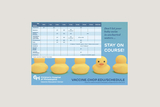Vaccine Schedule
The vaccine schedule is dynamic, meaning it changes over time. Changes can occur because of new vaccines, the removal of vaccines, updates to vaccine recommendations, vaccine shortages and more. This section of our website provides information about the schedule and related questions and topics, including considerations based on a person’s age or other factors, answers to questions about altering the schedule and contextual information and definitions related to the science behind the schedule.

Timetable
Find summaries of recommended vaccines for different age groups.

Science Behind the Vaccine Schedule
The immunization schedule changes over time as we learn more and as new vaccines are developed. You can think of the schedule like a map. Whereas a map helps people navigate a new area, the immunization schedule helps people navigate vaccine recommendations.

Age Groups and Vaccines
Vaccine visits and expectations following visits can go more smoothly with preparations before, during and after the appointment. Find age-based tips and resources in this section of the website.

Vaccine Considerations for Specific Groups
Some groups of people have special needs that should be considered in regard to vaccinations. In some cases, people with certain jobs may require extra protection, such as healthcare and childcare workers. In some situations, such as when traveling or when immune-compromised, pregnant or breastfeeding, vaccine questions may arise. And, in addition, some children have special vaccine needs, such as adoptees and preterm infants.

Altering the Vaccine Schedule
This page contains information and resources related to altering the recommended immunization schedule.

Other Schedule Issues
This page contains answers to questions related to the immunization schedule, such as whether the schedule is “one size fits all,” why it changes, what minimum intervals are, and more.
Reviewed by Paul A. Offit, MD on January 02, 2024